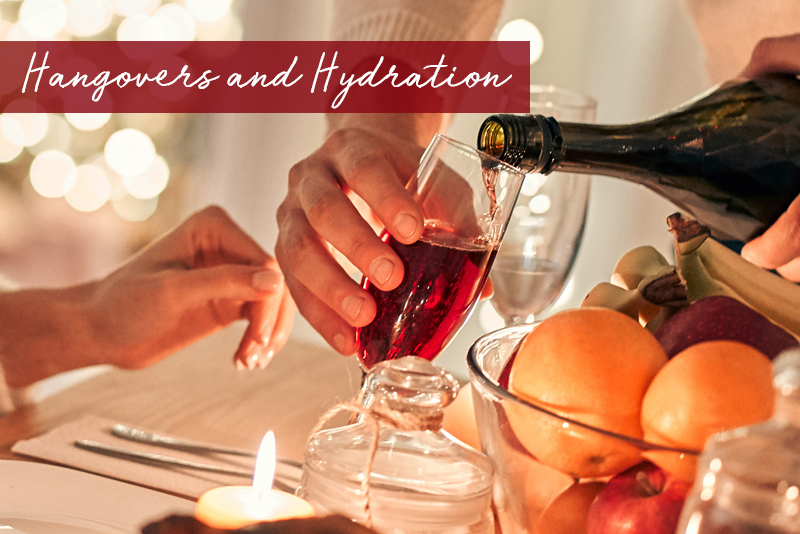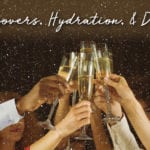By Jayashree Mani, MS, CCN, and Liz Friedman, MS
Once again the holidays are upon us, and people all over the world will be gathering with friends and family, feasting and feeling festive! Whether celebrating Hanukkah, Christmas, Kwanzaa or Omisaka, this year it’s with the additional hope that maybe, just maybe, we can finally put COVID-19 behind us. So… does that mean there will be more parties, social gatherings get-togethers, and alcohol? Absolutely!
In fact, the average American doubles their drinking during the holidays! While this excess merrymaking may be inevitable, the negative consequences (e.g., decreased productivity, calling in sick to work) may not be. The main negative consequence of alcohol consumption, of course, is the hangover. Research shows that approximately 75 percentof those who drink alcohol to intoxication will experience a hangover.
The symptoms of a hangover can vary from person to person, and can include headache, fatigue, thirst, weakness, muscle aches, irritability, sensitivity to light and sound, sweating, stomach pain, nausea, anxiety, vertigo, cognitive “fuzziness,” and increased blood pressure.
So, what actually happens in a hangover?
While the actual cause of a hangover is not completely understood, the mechanism appears to be multifactorial.
- Alcohol and alcohol withdrawal. The body works to break down the alcohol that’s consumed, and the first breakdown products are acetaldehyde, which is more toxic than alcohol, and free radicals which can damage cells. The longer alcohol and acetaldehyde stick around, the more damage they can do to cellular membranes, proteins and DNA, so the body races to metabolize acetaldehyde to the less toxic compound, acetate. Over time, as the level of alcohol in your blood slowly returns to zero and depending on how much you consumed, you may experience a hangover. In essence, your body is withdrawing from high levels of circulating alcohol, while at the same time trying to protect itself from the effects of alcohol. (The symptoms most associated with the toxicity of alcohol and acetaldehyde are sweating, skin flushing, nausea and vomiting).
- Alcohol consumption can dehydrate the body by:
- Increasing loss of fluids – you know those frequent trips to the bathroom!
- Inducing vomiting – further loss of water and electrolytes.
Alcohol itself is a diuretic (increases urine production), and the acetaldehyde mentioned above causes vomiting… and the ensuing dehydration can result in other hangover symptoms such as thirst, fatigue, and dizziness..
- Congeners are secondary compounds formed during fermentation that help determine the final “character” of the liquor. The darker a liquor’s color, the more congeners it contains. Researchers have shown that severe hangover occurred in 33 percent of subjects who ingested bourbon (which is high in congeners) but in only 3 percent of those who consumed the same dose of vodka (which is low in congeners).
- Cytokine release. Studies have found that there is a strong correlation between high levels of circulating cytokines and some hangover symptoms! We commonly think of cytokines being released by the immune system to battle an infection, but it turns out that excessive alcohol consumption can also provoke cytokine release! That may explain the hangover symptoms of muscle aches, fatigue, headache, nausea, cognitive “fuzziness” and irritability.
How can we minimize these effects?
Now that we know some contributing factors to hangovers, we can consume alcohol for our holiday merrymaking, keeping these tips in mind:
- Pace yourself. Sip slowly – try not to overdo it.
- Don’t mix your drinks – Mixing different alcoholic drinks can also cause a hangover.
- Choose lighter-colored alcohols to minimize congeners.
- Hydrate, hydrate, hydrate!
A good rule of thumb while consuming alcoholic beverages is to alternate a glass of water with an alcoholic beverage. Choose alkalinizing mineral waters like San Pellegrino or Gerolsteiner that can provide much needed electrolytes as well. Stay hydrated even after your special event; including the day after.
Check your hydration status using the PERQUE hydration protocol.
- Don’t skip food while drinking and the day after. Eat wisely – fresh fruits like potassium- rich bananas, water-laden watermelon, avocados, vegetables (especially greens), and lean protein including eggs and healthy nuts. Know which foods are immunologically non-reactive by taking the LRA Test.
- Reach for your supplements: Include the foundational PERQUE products below:
PERQUE Life Guard™ (or PERQUE Life Guard Mini™) – 40 essential nutrients provide 5 products in 1 to protect the heart, body, and brain.
PERQUE Potent C Guard™ powder – powerful personalized antioxidant protection to help reduce tissue damage with fully buffered and reduced 100% L-ascorbate.
PERQUE Mg Plus Guard™ and PERQUE Choline Citrate™ – formulated with 4 of the most bioavailable magnesium forms to enhance functional benefits. Paired with Choline citrate to enhance the uptake and not leave your Mg in your gut.
- If, despite your best efforts, a hangover strikes, consider supplementing with PERQUE Repair Guard™ or PERQUE Pain Guard Forté™ which contain quercetin dihydrate, an anti-inflammatory compound known to decrease expression of pro-inflammatory cytokines.
- When the season is over and you’re ready to get back on track, or if you’re looking to reset, reach for the PERQUE Detox group of nutrients which include:
PERQUE DetoxIn Guard™ – Unique nutrient synergy that reduces hormone disrupters and makes toxins easier and safer to remove while helping to restore immune function (which is essential for health).
PERQUE Potent C Guard™ powder – Powerful personalized antioxidant protection to help reduce tissue damage with fully buffered and reduced 100% L-ascorbate.
PERQUE EPA/DHA Guard™ – Synergistic combo of essential fatty acids that help remove plaque buildup in the heart and improve brain cell communication. Also improves brain and body health to counter Omega 6 inflammatory fats.
PERQUE Liva Guard™ – Gives the liver a needed boost for better detoxification, improved energy, and healthier immune function. Protects the liver from cell and tissue damage associated with environmental toxicity and urban living.
We wish you all a happy, healthy and hydrated holiday season, free from hangovers!
Did you enjoy this post? We post new content regularly! Click here to see our latest blog posts.





